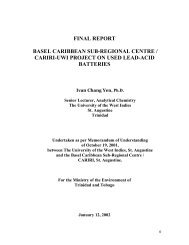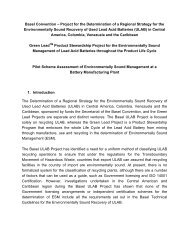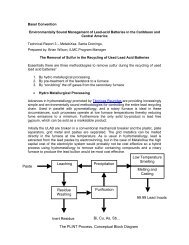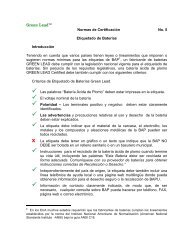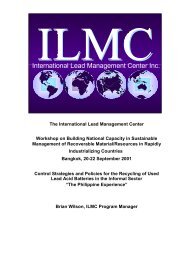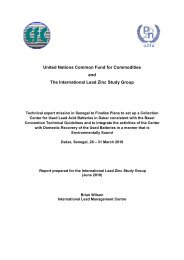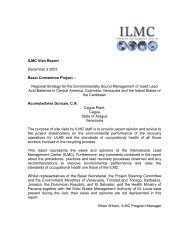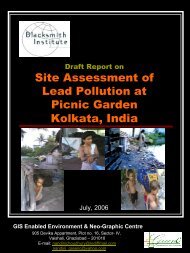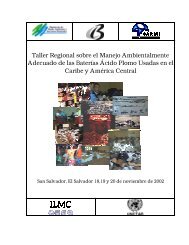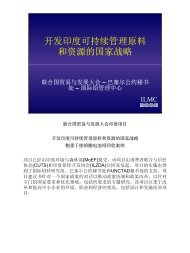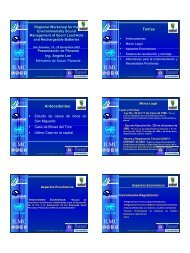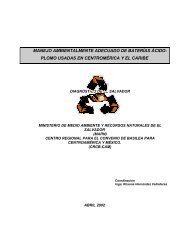Assessment Report 1 - the International Lead Management Center ...
Assessment Report 1 - the International Lead Management Center ...
Assessment Report 1 - the International Lead Management Center ...
You also want an ePaper? Increase the reach of your titles
YUMPU automatically turns print PDFs into web optimized ePapers that Google loves.
<strong>Assessment</strong> <strong>Report</strong> 1 - Recycling Plant<br />
Basel Convention – Project for <strong>the</strong> Determination of a Regional Strategy for <strong>the</strong><br />
Environmentally Sound Recovery of Used <strong>Lead</strong> Acid Batteries (ULAB) in Central<br />
America, Colombia, Venezuela and <strong>the</strong> Caribbean<br />
Green <strong>Lead</strong> TM Product Stewardship Project for <strong>the</strong> Environmentally Sound<br />
<strong>Management</strong> of <strong>Lead</strong> Acid Batteries throughout <strong>the</strong> Product Life Cycle<br />
Pilot Scheme <strong>Assessment</strong> of Environmentally Sound <strong>Management</strong> at a Used <strong>Lead</strong><br />
Acid Battery Recycling Plant<br />
1. Introduction<br />
The Determination of a Regional Strategy for <strong>the</strong> Environmentally Sound Recovery of<br />
Used <strong>Lead</strong> Acid Batteries (ULAB) in Central America, Colombia, Venezuela and <strong>the</strong><br />
Caribbean, sponsored by funds <strong>the</strong> Secretariat of <strong>the</strong> Basel Convention, and <strong>the</strong> Green<br />
<strong>Lead</strong> Projects are separate and distinct ventures. The Basel ULAB Project is focused<br />
solely on recycling ULAB, whereas <strong>the</strong> Green <strong>Lead</strong> Project is a Product Stewardship<br />
Program that embraces <strong>the</strong> whole Life Cycle of <strong>the</strong> <strong>Lead</strong> Acid Battery from mining<br />
through manufacture, use and recycling in <strong>the</strong> determination of Environmentally Sound<br />
<strong>Management</strong> (ESM).<br />
The Basel ULAB Project has identified a need for a uniform method of classifying ULAB<br />
recycling operations to ensure that under <strong>the</strong> regulations for <strong>the</strong> Transboundary<br />
Movement of Hazardous Waste, countries that export ULAB can assured that recycling<br />
facilities in <strong>the</strong> country of import are environmentally sound. At present, <strong>the</strong>re is no<br />
formalized system for <strong>the</strong> classification of recycling plants, although <strong>the</strong>re are a number<br />
of factors that can be used as a guide, such as Government licensing and ISO 14001<br />
Certification. However, investigations undertaken in <strong>the</strong> Central American and<br />
Caribbean region during <strong>the</strong> Basel ULAB Project has shown that none of <strong>the</strong><br />
Government licensing arrangements or independent certification schemes for <strong>the</strong><br />
determination of ESM include all <strong>the</strong> requirements set out in <strong>the</strong> Basel Technical<br />
Guidelines for <strong>the</strong> Environmentally Sound Recovery of ULAB.
The Green <strong>Lead</strong> Project seeks to retain lead acid batteries in a closed loop of well<br />
managed environmentally responsible stages in <strong>the</strong> life cycle. To this end <strong>the</strong> Green<br />
<strong>Lead</strong> Project needs to certify those operations in <strong>the</strong> life cycle as environmentally sound<br />
so that all <strong>the</strong> players in <strong>the</strong> life cycle pass <strong>the</strong> batteries through Green <strong>Lead</strong> Certified<br />
links in <strong>the</strong> Product Chain.<br />
Both projects recognize that ESM means more than just ensuring that atmospheric<br />
emissions, effluent discharges and waste residues are controlled to national and<br />
international standards. The Sound <strong>Management</strong> of lead products also requires control<br />
of pathways to biological exposure at <strong>the</strong> workplace and in <strong>the</strong> population. Safe working<br />
conditions throughout <strong>the</strong> production and recovery processes are also a vital factor. It is<br />
also becoming increasingly important to educate <strong>the</strong> users of <strong>Lead</strong> Acid Batteries (LAB)<br />
in <strong>the</strong> proper use of <strong>the</strong> products, particularly as more LAB are being used innocuously<br />
in security and emergency systems and as power sources for computer networks.<br />
It is clear that <strong>the</strong>re is a high degree of overlap between <strong>the</strong> two projects in <strong>the</strong> area of<br />
ESM Certification. Consequently, <strong>the</strong> Secretariat of <strong>the</strong> Basel Convention and <strong>the</strong> Green<br />
<strong>Lead</strong> Work Group has agreed to work toge<strong>the</strong>r on <strong>the</strong> preparation of a formalized<br />
process for <strong>the</strong> independent assessment and certification of ULAB recycling facilities.<br />
The Standards used as <strong>the</strong> “Benchmark” by <strong>the</strong> Basel ULAB Project are <strong>the</strong> criteria set<br />
out in <strong>the</strong> Basel Technical Guidelines. The Green <strong>Lead</strong> Project has been establishing a<br />
series of Protocols for “Best Practice” in <strong>the</strong> Industry. Whilst <strong>the</strong> Green <strong>Lead</strong> Protocols<br />
are still subject to revision <strong>the</strong>y already contain all <strong>the</strong> factors set out in <strong>the</strong> Basel<br />
Technical Guidelines and so <strong>the</strong> two approaches to ESM are entirely compatible.<br />
Both projects recognize <strong>the</strong> value of Government Licensing arrangements and existing<br />
schemes for <strong>the</strong> determination of ESM such as ISO 14001. Nei<strong>the</strong>r of <strong>the</strong> two Projects is<br />
seeking to add ano<strong>the</strong>r administrative burden to ei<strong>the</strong>r Government Agencies in <strong>the</strong><br />
control of Transboundary movements of hazardous waste, or industry in <strong>the</strong>ir quest for<br />
proof of ESM. In this respect, it is envisaged that any Certification Scheme will make<br />
provision for exemptions for those factors audited under ISO 14001 or any o<strong>the</strong>r<br />
recognized certification process. The inclusion of such a provision will reduce<br />
considerably <strong>the</strong> time and resources required for <strong>the</strong> an ESM Certification Audit, but <strong>the</strong><br />
implementation of such provisions will require an initial <strong>Assessment</strong> of ESM at any<br />
facility under consideration for Certification.
Such an <strong>Assessment</strong> Process will primarily seek to identify those factors of ESM in<br />
compliance with ei<strong>the</strong>r <strong>the</strong> Basel Technical Guidelines or <strong>the</strong> Green <strong>Lead</strong> Protocols and<br />
those factors in need of a full Audit to determine <strong>the</strong> level of ESM. For <strong>the</strong> <strong>Assessment</strong><br />
Process to work effectively it needs to be simple to administer and objective in <strong>the</strong><br />
classification of compliance. Ideally, <strong>the</strong> <strong>Assessment</strong> Process should be designed so<br />
that it can also be used internally by an organization wishing to determine its level of<br />
ESM prior to any formal application for ESM Certification. In this way, organizations can<br />
identify <strong>the</strong>ir own shortcomings and take action to remedy <strong>the</strong> situation before <strong>the</strong>y<br />
commit resources to a full audit.<br />
The current phase of <strong>the</strong> Basel ULAB Project requires an <strong>Assessment</strong> for ESM of a<br />
Recycling facility and a Battery Manufacturing Plant. The Green <strong>Lead</strong> Pilot Scheme is<br />
currently working on <strong>the</strong> <strong>Assessment</strong> of ESM at a number of plants around <strong>the</strong> world<br />
and both Project Teams agreed that a Recycling Plant in Central or South America<br />
would be a suitable company to trial an <strong>Assessment</strong> Process.<br />
The <strong>Assessment</strong> Forms cover eight factors deemed essential for <strong>the</strong> determination of<br />
ESM and were initially developed to assist with <strong>the</strong> ULAB inventory requirements of <strong>the</strong><br />
Basel ULAB Projects in 2001; fur<strong>the</strong>r honed in 2003 and 2004 in Cambodia and again<br />
modified by <strong>the</strong> Green <strong>Lead</strong> Work Group in 2005 for use in <strong>the</strong> Pilot Scheme.<br />
The <strong>Assessment</strong> Process is designed to obtain information and data relevant to ESM in<br />
<strong>the</strong> following eight factors:<br />
i. Process or Production Unit(s)<br />
ii. Environmental Status<br />
iii. Occupational <strong>Lead</strong> Exposure<br />
iv. Safety<br />
v. Suppliers and Customers<br />
vi. ULAB Recycling Plants<br />
vii. Community Issues - Awareness and Attitudes<br />
viii. Product Use – Domestic/Industrial<br />
It must be emphasized that this exercise is to test of <strong>the</strong> <strong>Assessment</strong> Process and <strong>the</strong><br />
<strong>Assessment</strong> Forms to ascertain <strong>the</strong>ir suitability as a useful first step in <strong>the</strong> Certification<br />
procedure, and it is not a formal assessment of <strong>the</strong> recycling operation at <strong>the</strong> Recycling<br />
Plant.
2. The <strong>Assessment</strong> Process – Recycling Plant<br />
The <strong>Assessment</strong> of <strong>the</strong> Recycling Plant was undertaken on 23 January 2006.<br />
Thanks must be given to <strong>the</strong> <strong>Management</strong> of <strong>the</strong> Recycling Company for <strong>the</strong><br />
<strong>Assessment</strong> Process to be conducted in as au<strong>the</strong>ntic a situation as possible.<br />
The <strong>Assessment</strong> Process was conducted in three stages:<br />
• The first stage was an interview of approximately 45 minutes with <strong>the</strong><br />
manager responsible for <strong>the</strong> specific area of ESM being assessed.<br />
• The second stage was a tour of <strong>the</strong> Recycling Plant to check that<br />
information relevant to ESM given during <strong>the</strong> interviews was consistent<br />
with operating practices.<br />
• The third stage was to review <strong>the</strong> <strong>Assessment</strong> Forms and make any<br />
amendments required to clarify ambiguities in <strong>the</strong> questions and data<br />
requirements, and to add questions where additional information was<br />
deemed to be necessary to complete <strong>the</strong> <strong>Assessment</strong>.<br />
To make <strong>the</strong> <strong>Assessment</strong> exercise as realistic as possible any areas of non-compliance<br />
identified during <strong>the</strong> interviews or <strong>the</strong> plant tour are shown in bold Red text on <strong>the</strong><br />
<strong>Assessment</strong> Forms; as <strong>the</strong>y would be for an actual <strong>Assessment</strong>. This provides a quick<br />
reference point for <strong>the</strong> Company and <strong>the</strong> Assessors, when reviewing <strong>the</strong> assessment<br />
and deciding on <strong>the</strong> recommendations for action to correct any non-compliance. All <strong>the</strong><br />
elements of each factor in compliance are recorded as black text.<br />
Any amendments to <strong>the</strong> <strong>Assessment</strong> Forms are shown in Blue text.<br />
Respective managers and employees of <strong>the</strong> Recycling Plant were interviewed.<br />
3. Results of <strong>the</strong> <strong>Assessment</strong> Exercise.<br />
The <strong>Assessment</strong> Forms provided a very quick insight into <strong>the</strong> extent of ESM at <strong>the</strong><br />
Recycling Plant.
It was very straightforward to record those elements of ESM in compliance with <strong>the</strong><br />
Basel Technical Guidelines and <strong>the</strong> Green <strong>Lead</strong> Protocols.<br />
Elements of non-compliance with <strong>the</strong> Basel Technical Guidelines and <strong>the</strong> Green <strong>Lead</strong><br />
Protocols were easily identified and <strong>the</strong> reasons, wherever possible, recorded on <strong>the</strong><br />
forms.<br />
Feedback from <strong>the</strong> Managers interviewed was positive and none felt that <strong>the</strong> process<br />
had been a burden for <strong>the</strong>m. Three additional questions have been added to <strong>the</strong> forms<br />
and some additional points of clarification were made and <strong>the</strong> forms amended<br />
accordingly.<br />
o<br />
Amendments made to <strong>the</strong> forms<br />
• 1. General Information<br />
Added a line to record <strong>the</strong> Company’s Internet Site – A key interactive<br />
communication tool with Customers, Government Agencies who might<br />
want to check <strong>the</strong> environmental credentials of <strong>the</strong> Company, <strong>the</strong> general<br />
public and NGOs.<br />
• 5. Safety<br />
Added one additional question (14) to ascertain if <strong>the</strong> Company used a<br />
Permit to Work System for all maintenance tasks.<br />
• 6. Suppliers and Customers<br />
One new question (11) was added to note <strong>the</strong> national and international<br />
legislative requirements for <strong>the</strong> transport of new Lab and ULAB.<br />
During <strong>the</strong> interview with <strong>the</strong> Safety and Environmental Superintendent it became<br />
apparent that <strong>the</strong> Risk <strong>Assessment</strong> requirements of ISO 9001 and 9002 would provide<br />
Audit exemption for <strong>the</strong> Safety Category (Number 5). The non-compliance note for <strong>the</strong><br />
abrasive wheels and power tools will be corrected when <strong>the</strong> present ISO 9002 Risk<br />
<strong>Assessment</strong>s are completed later this year.
The questions in <strong>the</strong> <strong>Assessment</strong> process that revealed areas of non-compliance were:<br />
• Occupational <strong>Lead</strong> Exposure<br />
In <strong>the</strong> absence of a national blood testing laboratory, <strong>the</strong> Company monitors<br />
workers levels of lead exposure using ZPP analysis of blood samples,. This<br />
method of monitoring employee’s lead exposure is now discredited and lead in<br />
blood analysis is <strong>the</strong> only surveillance procedure recognized by <strong>the</strong> Basel<br />
Technical Guidelines, <strong>the</strong> CDC, OSHA and <strong>the</strong> Green <strong>Lead</strong> Protocols.<br />
• Safety<br />
There were no written procedures or formal training requirements for <strong>the</strong> use of<br />
Abrasive Wheels and Power Tools on site.<br />
• Suppliers and Customers<br />
The Company does not specify, or require suppliers of ULAB <strong>the</strong> need to collect,<br />
store and transport ULAB in accordance with <strong>the</strong> Basel Technical Guidelines or<br />
<strong>the</strong> Green <strong>Lead</strong> Protocols.<br />
• Recycling Plants<br />
The absence of any written standards for ULAB deliveries to <strong>the</strong> Site means that<br />
many ULAB sourced from Garages and Service <strong>Center</strong>s outside <strong>the</strong> Group arrive<br />
at <strong>the</strong> recycling plant drained of acid and packed on <strong>the</strong>ir side. (See Appendix 2)<br />
The Company has not issued guidelines to suppliers to instruct <strong>the</strong>m in <strong>the</strong><br />
correct procedures to contain and deal with acid spillage and did not know what<br />
steps were taken by suppliers to deal with this issue.<br />
• Community Issues - Awareness and Attitudes<br />
Only one person was interviewed in this category, but <strong>the</strong> views expressed were<br />
understood to be typical of <strong>the</strong> situation in <strong>the</strong> Country. The issues highlighted as<br />
non-compliant relate to information about <strong>the</strong> hazards of lead exposure in <strong>the</strong><br />
general population.
Such information has traditionally been made available by Government sources,<br />
but today, companies are expected to be pro active and in <strong>the</strong> absence of any<br />
action by Government, lead producers should ensure that <strong>the</strong> communities living<br />
close to <strong>the</strong> plant and users of lead products are made aware of <strong>the</strong> hazards of<br />
lead exposure and improper disposal of ULAB.<br />
The Plant inspection confirmed that all <strong>the</strong> information given by <strong>the</strong> Managers during <strong>the</strong><br />
course of <strong>the</strong> interviews was correct.<br />
4. Conclusions<br />
• The <strong>Assessment</strong> Process was relatively quick and straightforward to apply.<br />
• The modified <strong>Assessment</strong> Forms cover every aspect of <strong>the</strong> Basel Technical<br />
Guidelines and <strong>the</strong> Green <strong>Lead</strong> Protocols.<br />
• The layout of <strong>the</strong> forms provides adequate space to record information, data and<br />
summaries of findings.<br />
• The use of bold Red text serves to highlight <strong>the</strong> areas of non compliance at a<br />
glance.<br />
• Mangers interviewed during <strong>the</strong> <strong>Assessment</strong> Process were not hugely<br />
inconvenienced.<br />
• ISO 9001 and ISO 9002 Certification will provide exemption from <strong>the</strong> Safety<br />
Audit as will ISO 14001 Certification from <strong>the</strong> Environmental Audit.<br />
• Where ISO 9001, 9002 and 14001 Certifications are used for audit exemption, a<br />
record must be made of <strong>the</strong> appropriate Certification number and renewal date.<br />
• Use of <strong>the</strong> <strong>Assessment</strong> Forms will clearly identify those factors that can be<br />
exempt from a full Certification Audit.<br />
• With a little training <strong>the</strong> forms can be used internally for an objective “in house”<br />
<strong>Assessment</strong> of ESM. Useful and cost effective in situations where a Company is<br />
considering an application for Certification, but is unsure about its overall<br />
performance.
• None of <strong>the</strong> areas of non-compliance were a surprise to <strong>the</strong> Company, but it has<br />
to be noted that it was not <strong>the</strong> Company’s environmental performance that was<br />
being tested. The fact is that <strong>the</strong> Recycling Plant provided an excellent testing<br />
ground for <strong>the</strong> <strong>Assessment</strong> Process.<br />
• Use of <strong>the</strong> <strong>Assessment</strong> forms to ask questions about plant performance<br />
generated a healthy and non confrontational dialogue with <strong>the</strong> Plant Managers<br />
5. Recommendations<br />
• All <strong>the</strong> modifications made to <strong>the</strong> <strong>Assessment</strong> Forms and <strong>the</strong> Process (inclusion<br />
of ISO 9001 and 9002) should be adopted.<br />
• The <strong>Assessment</strong> of any ULAB Recycling Plant should not be deemed to be in<br />
full compliance without visiting several suppliers of ULAB to inspect and assess<br />
collection centers, transport arrangements and <strong>the</strong> manual handling of <strong>the</strong><br />
ULAB.<br />
• The Steering Committees of both Projects should consider Fast Tracking <strong>the</strong><br />
Certification any Company for ESM if <strong>the</strong> Company demonstrates Full<br />
Compliance with <strong>the</strong> Basel Technical Guidelines and/or <strong>the</strong> Green <strong>Lead</strong><br />
Protocols at <strong>the</strong> <strong>Assessment</strong> Stage.<br />
Brian Wilson<br />
ILMC<br />
March 13, 2006
No. 1 ………<br />
Green <strong>Lead</strong> Site <strong>Assessment</strong> Form<br />
This Form is designed to provide information to assist in <strong>the</strong> assessment of Pilot Scheme<br />
suitability.<br />
1.0 General Information<br />
Company Name<br />
Confidential<br />
Location<br />
Central / South America<br />
Date 23 January 2006<br />
Name of lead recycling plant/business/home<br />
Name of interviewee(s)/host(s)<br />
Position of interviewee/host in <strong>the</strong> Company<br />
The Recycling Plant<br />
Confidential<br />
Production Manager<br />
Company Address<br />
Confidential<br />
Phone number<br />
Facsimile number<br />
Internet Web Site<br />
E-mail address of main contact person<br />
Name of Interviewer(s)<br />
Confidential<br />
Confidential<br />
Confidential<br />
Confidential<br />
Brian Wilson<br />
Operational area (m 2 /ha) 30,000 m 2<br />
Does <strong>the</strong> operation have ESM Certification<br />
such as ISO 14001 or equivalent National<br />
Award?<br />
Is <strong>the</strong>re a Safety Award such as OHSAS<br />
18001 or equivalent or participation in <strong>the</strong><br />
MCEP?<br />
No, but <strong>the</strong> Company is preparing for ISO 9002<br />
Audit.<br />
No, but risk assessments are being undertaken<br />
as part of ISO 9002 Certification
2.0 Process or Production Unit(s)<br />
No.<br />
Type of Process –<br />
Mining/Smelting/Manufacturing/Recycling<br />
Smelting<br />
1 <strong>Lead</strong> bearing materials Processed Used <strong>Lead</strong> Acid Batteries (ULAB)<br />
2<br />
3<br />
4<br />
5<br />
6<br />
7<br />
8<br />
9<br />
10<br />
11<br />
12<br />
13<br />
14<br />
15<br />
16<br />
17<br />
18<br />
19<br />
20<br />
Annual quantity of leaded materials<br />
Procedures for leaded material delivery/collection<br />
Facilities for <strong>the</strong> reception of leaded materials<br />
Procedures for sorting primary/scrap materials<br />
Mechanical or manual material handling<br />
Battery component manufacturing/separation<br />
process<br />
Separate component storage/transport system<br />
Material smelting/melting/refining processes<br />
Type and number of Furnace(s)/Kettles<br />
Furnace/kettle charging system<br />
Furnace/kettle combustion conditions<br />
Furnace/kettle hygiene regime<br />
Type of Baghouse ventilation systems<br />
Furnace lead and slag/dross removal regimes<br />
Dross/slag treatment, storage and disposal<br />
regime<br />
What are <strong>the</strong> internal/external Recycling<br />
processes for drosses and by-products?<br />
By-products segregation and storage<br />
What is <strong>the</strong> by-product treatment processes?<br />
What are <strong>the</strong> Bullion/Ingot casting/battery<br />
production line procedures?<br />
~ 15,000 metric tons ULAB<br />
By acid resistant lined trucks with<br />
ULAB in <strong>the</strong> upright position<br />
Covered concrete/plastic brick<br />
impervious floor with drainage & sump<br />
ULAB manually removed from pallets<br />
and fed to <strong>the</strong> MA 11 for crushing<br />
ULAB offloading is by FLT<br />
All o<strong>the</strong>r movements are manual<br />
MA ULAB process – crushing, <strong>the</strong>n<br />
screen and gravity separation<br />
Metallics to a bin; oxide to de-watering<br />
bays; polypropylene to container<br />
<strong>Lead</strong> Smelting<br />
5 rotary Furnaces<br />
1 semi automatic; 4 manual<br />
Waste oil / air burner with reducing<br />
agent in <strong>the</strong> furnace at 1100 o C<br />
Balanced flue extraction for <strong>the</strong><br />
furnace, all ventilation passes through<br />
cyclones and filter plants<br />
Polyester needle loomed felt sleeve<br />
filtration<br />
I front end tapping system<br />
4 middle tapping regimes<br />
Furnace slag is confined on site<br />
Casting drosses, baghouse fume and<br />
spillage are returned to <strong>the</strong> Furnaces<br />
Drosses are stored in open bins;<br />
baghouse fume in closed bins<br />
Furnace smelting<br />
Automatic casting of lead ingots on a<br />
continuous conveyor<br />
21 Where are <strong>the</strong> lead raw materials sourced? As 4.
3.0 Environmental Status<br />
1<br />
2<br />
3<br />
4<br />
Chemical composition of <strong>the</strong> discard/waste<br />
materials<br />
Atmospheric discharge limits for leaded<br />
processes<br />
Mean atmospheric discharge results for leaded<br />
processes<br />
Surface water treatments prior to discharge of<br />
site effluents<br />
All hazardous waste is contained on<br />
site – lead content less than 5%<br />
50 mg/m 3 Pb<br />
0.13 – 0.35 mg/m 3<br />
Surface water from roofs is passed<br />
through a separator prior to discharge<br />
5 How is waste battery acid treated?<br />
6 How is <strong>the</strong> waste liquid effluent discharged?<br />
7 Standards for <strong>the</strong> discharge of leaded effluent?<br />
Neutralized at <strong>the</strong> WTP & <strong>the</strong>n used<br />
for process water. Residue to Furnace<br />
The waste liquid effluent is not<br />
discharged to <strong>the</strong> environment<br />
Government Standard , but N/A as no<br />
leaded effluent is discharged<br />
8 Is <strong>the</strong>re a common drainage system?<br />
9<br />
How are solid and liquid waste materials<br />
stored?<br />
No. Process and surface water drains<br />
are segregated<br />
Discard solid waste is contained.<br />
Liquid waste is stored in glass fiber<br />
tanks<br />
10 12 month wind speed and direction profile Company does not have this data<br />
11 Storage area ventilation system Open to <strong>the</strong> atmosphere<br />
12 Face velocities for extraction/ventilation units<br />
13 Baghouse maintenance regimes<br />
14<br />
15<br />
Chemical composition of <strong>the</strong> baghouse fume<br />
(dust)<br />
Disposal/treatment methods for <strong>the</strong> baghouse<br />
fume (dust)<br />
No suitable instruments to measure<br />
face velocities<br />
Daily collection of fume. Monthly and<br />
bi-monthly maintenance of filter<br />
systems<br />
Normally 20 - 30% lead and o<strong>the</strong>r<br />
standard components<br />
Re-circulated with <strong>the</strong> lead oxide paste<br />
16<br />
17<br />
18<br />
How close is <strong>the</strong> general population to <strong>the</strong><br />
plant?<br />
Who is responsible for environmental<br />
management on <strong>the</strong> site?<br />
Have any complaints been raised by adjacent<br />
communities in <strong>the</strong> past 12 months?<br />
A few houses 100 m from <strong>the</strong> plant,<br />
and <strong>the</strong>n a village 600 m away<br />
<strong>Management</strong> Team under <strong>the</strong><br />
guidance of <strong>the</strong> Environment Officer<br />
Yes – <strong>the</strong> same complaint on every<br />
occasion – a bad smell sometimes
4.0 Occupational <strong>Lead</strong> Exposure<br />
1 Number of employees 89<br />
2 Age and service profiles<br />
3<br />
Labor turnover rates<br />
See Appendix 1 – 76% of employees<br />
are under 30 years of age<br />
59% per annum<br />
4 Hours of work 4 rota x 12 hour continuous shiftwork<br />
5<br />
6<br />
7<br />
What are <strong>the</strong> changing facilities prior to and<br />
after work?<br />
What is <strong>the</strong> washing and changing regime at <strong>the</strong><br />
end of work?<br />
Are personnel issued with special protective or<br />
works clothing?<br />
8 How often is <strong>the</strong> works clothing washed?<br />
9 Is process clothing washed at <strong>the</strong> site?<br />
10<br />
Are respirators issued and worn by employees<br />
in exposed areas?<br />
Segregated clean and work clo<strong>the</strong>s<br />
change room, toilets and showers<br />
All work clo<strong>the</strong>s collected for laundry.<br />
Employees shower before leaving<br />
work.<br />
Overalls, socks, boots, gloves<br />
(various), hard hat, goggles/face mask,<br />
respirator<br />
At <strong>the</strong> end of every shift or when<br />
necessary during a shift<br />
Purpose built laundry room – Effluent<br />
drains to WTP<br />
Neoprene respirators with dust filters<br />
11 Are eating and process areas segregated? Separate air conditioned canteen<br />
12 Are <strong>the</strong> eating areas free of lead dust?<br />
13<br />
14<br />
Do employees wash <strong>the</strong>ir hands and face prior<br />
to eating?<br />
What is <strong>the</strong> range and mean lead in blood levels<br />
for employees (preferably by department)<br />
Canteen regularly tested by taking<br />
swabs<br />
Yes – There are wash basins at <strong>the</strong><br />
exit of <strong>the</strong> plant<br />
No blood lead surveillance program 1<br />
15 What is <strong>the</strong> lead in blood trend? No blood lead surveillance program 1<br />
16 Is <strong>the</strong>re a hygiene surveillance program?<br />
Yes – Blood sampling for ZPP<br />
analysis<br />
17 Is <strong>the</strong>re a respirator policy? Yes<br />
18 Is <strong>the</strong>re a hygiene policy? Yes<br />
19<br />
20<br />
21<br />
Do workers understand <strong>the</strong> health risks<br />
associated with lead?<br />
Who is responsible for occupational health at<br />
<strong>the</strong> Site?<br />
Does <strong>the</strong> plant have a dedicated health clinic<br />
and Occupational Nurse?<br />
Yes – All employees attend induction<br />
training and plant familiarization<br />
<strong>Management</strong> Team under guidance of<br />
<strong>the</strong> Medical Officer (MO) and Nurse<br />
Yes – Full time MO & Occupational<br />
Nurse, & part time Pediatric Nurse<br />
1 Due to start Spring 2006
5.0 Safety<br />
1 Is <strong>the</strong>re a written and published Safety Policy? Yes<br />
2 Is <strong>the</strong>re an emergency and disaster plan? Yes<br />
3 Is <strong>the</strong>re a regular Safety Inspection and Audit? Yes<br />
4<br />
5<br />
Have risk assessments been carried out for<br />
each operation?<br />
Does every employee undergo a Safety<br />
Training Induction?<br />
Yes as part of <strong>the</strong> ISO 9002<br />
requirements<br />
Yes<br />
6 Is <strong>the</strong>re a record of every accident on site? Yes<br />
7 Is every accident investigated? Yes<br />
8 Is <strong>the</strong>re a multi-stakeholder Safety Committee?<br />
Yes. Managers, workers and Safety<br />
personnel<br />
9 Are <strong>the</strong>re special procedures for <strong>the</strong> following? -------------------------------------------<br />
9a - Confined Space Entry<br />
9b - Lockout/Tagout<br />
9c - Working at heights<br />
9d - Materials Handling<br />
9e - Mobile Equipment<br />
9f - Hazardous materials/Explosives<br />
9g - Ladders and Scaffolding<br />
9h – Abrasive Wheels and Power Tools<br />
Yes<br />
Yes<br />
Yes<br />
Yes<br />
Yes<br />
Yes<br />
Yes<br />
No<br />
10<br />
11<br />
12<br />
9i – Welding (of any material)<br />
Who is responsible for <strong>the</strong> Implementation and<br />
Evaluation of <strong>the</strong> Safety Program?<br />
It is mandatory to wear PPE if <strong>the</strong> Safety Risk<br />
<strong>Assessment</strong> deems it necessary?<br />
Are pedestrian walkways segregated and<br />
clearly marked from roadways and operating<br />
areas?<br />
Yes<br />
Safety and Environmental Manager<br />
13 Do emergency exits display direction signs? Yes<br />
Yes<br />
Yes<br />
14<br />
Is <strong>the</strong>re a Permit to Work System for<br />
maintenance?<br />
Yes
6.0 Suppliers and Customers<br />
1<br />
What companies are <strong>the</strong> main suppliers of<br />
leaded materials to <strong>the</strong> site?<br />
Garages, retailers and collection<br />
centers in <strong>the</strong> Region<br />
2<br />
What are <strong>the</strong> annual quantities of purchased<br />
leaded raw materials (ULAB for recyclers)?<br />
~ 15,000 MT ULAB<br />
3<br />
What are <strong>the</strong> main outlets for <strong>the</strong> finished<br />
products from <strong>the</strong> site?<br />
Main Automotive Battery Distributors in<br />
<strong>the</strong> Region<br />
4<br />
How are <strong>the</strong> finished products transported from<br />
<strong>the</strong> Site?<br />
Shrink wrapped, Palletized and by truck<br />
5<br />
6<br />
7<br />
8<br />
9<br />
10<br />
11<br />
Does a company representative visit <strong>the</strong><br />
premises of suppliers of leaded materials to <strong>the</strong><br />
site?<br />
Does a company representative visit <strong>the</strong><br />
premises of <strong>the</strong> customers of <strong>the</strong> leaded<br />
products?<br />
Does <strong>the</strong> company provide health, safety and<br />
environmental information to its customers<br />
about its products?<br />
Does <strong>the</strong> Company provide its Customers with<br />
information about environmentally safe disposal<br />
at <strong>the</strong> end of its product’s life?<br />
Can Customers contact <strong>the</strong> Company to ask<br />
about <strong>the</strong> use and disposal of its leaded<br />
products?<br />
Does <strong>the</strong> Company impose any environmental<br />
standards of performance on its suppliers of<br />
leaded materials?<br />
What National and/or <strong>International</strong> Protocols<br />
are applied to <strong>the</strong> transport of new and/or used<br />
lead acid batteries?<br />
The Scrap Purchasing Manager visits<br />
local ULAB suppliers once a month and<br />
all o<strong>the</strong>r suppliers every three months<br />
There are regular visits by <strong>the</strong> Sales<br />
Manager and his team and also <strong>the</strong><br />
Quality Control Manager<br />
There is an Company leaflet for<br />
suppliers and retailers with health,<br />
safety and environmental information<br />
There is information available from <strong>the</strong><br />
Retailer and printed on <strong>the</strong> LAB<br />
There are contact numbers on <strong>the</strong> LAB<br />
and <strong>the</strong> Company Web Site<br />
Not formally, but a priority task of <strong>the</strong><br />
new Scrap Purchasing Manager will<br />
be to introduce standards in<br />
compliance with <strong>the</strong> Basel Technical<br />
Guidelines<br />
Domestic Transport Laws for new LAB<br />
and <strong>the</strong> Basel Technical Guidelines for<br />
ULAB. Basel Convention<br />
Transboundary Regulations for<br />
imported ULAB
7.0 ULAB Recycling Plants<br />
1 Are any ULAB recycled from imported sources? Yes, Countries in <strong>the</strong> Region<br />
2<br />
What are <strong>the</strong> annual quantities of ULAB<br />
recycled?<br />
~ 15,000 MT<br />
3 Are used batteries collected at <strong>the</strong> retail outlets? Yes and service centers and garages<br />
4<br />
What happens to ULAB collected at retail<br />
outlets?<br />
Stored and returned to The Recycling<br />
Plant for recycling<br />
5 How are ULAB stored at <strong>the</strong> retail outlets? Upright on pallets<br />
6<br />
How are ULAB collected at retail outlets<br />
transported to recyclers?<br />
Usually by acid resistant lined trucks<br />
7<br />
Are ULAB drained of acid prior to<br />
transportation?<br />
8 Are ULAB reconditioned?<br />
Some occasions (see appendix 2)<br />
Not by <strong>the</strong> Company, only by informal<br />
sector traders<br />
9 Where are used batteries reconditioned? Not known<br />
10<br />
11<br />
Number of used battery collection centers or<br />
retailers or service centers collecting ULAB<br />
How are ULAB stored in <strong>the</strong> collection centers,<br />
retailers or service centers?<br />
Not known<br />
Normally on an impervious floor,<br />
upright and on pallets<br />
12 How is spillage contained in collection centers? Not known<br />
13<br />
14<br />
What are <strong>the</strong> transport arrangements from <strong>the</strong><br />
retailers or collection/service centers to <strong>the</strong><br />
recycler?<br />
Are ULAB recycled in <strong>the</strong> country <strong>the</strong>y are<br />
collected?<br />
Shrink wrapped, palletized loads<br />
collected by special truck<br />
Only those collected within country<br />
borders<br />
15 Are any used batteries exported for recycling? No<br />
16<br />
17<br />
18<br />
19<br />
20<br />
Where are used batteries exported for<br />
recycling?<br />
What are <strong>the</strong> regulations for <strong>the</strong> export of<br />
ULAB?<br />
What special precautions are taken for <strong>the</strong> transboundary<br />
shipment ULAB?<br />
Is <strong>the</strong> battery electrolyte drained prior to transboundary<br />
shipment?<br />
What happens to ULAB that are not collected for<br />
recycling?<br />
N/A<br />
Basel Convention for Transboundary<br />
Movement of hazardous Waste, but<br />
N/A<br />
Documentation is in order<br />
Not by <strong>the</strong> Company, but some<br />
ULAB are drained prior to delivery<br />
to <strong>the</strong> collection centers-Appendix 2<br />
Not known
8.0 Community Issues - Awareness and Attitudes<br />
What do you know about lead<br />
1<br />
contamination from ULAB?<br />
Have you ever attended a health<br />
2<br />
awareness class about lead?<br />
Do you know <strong>the</strong> effects of lead<br />
exposure on <strong>the</strong>:<br />
• Environment; atmosphere,<br />
3<br />
water, soil, eco systems?<br />
• Population – Adults and<br />
Children?<br />
4 How often do you come into<br />
contact with <strong>Lead</strong> Acid Batteries?<br />
What do you do with your used<br />
5<br />
ULAB and why?<br />
What do you think should be done<br />
6<br />
with a used ULAB?<br />
In your opinion, how should <strong>the</strong><br />
7 problem of lead contamination<br />
from ULAB be solved?<br />
What incentives encourage you to<br />
8 return a used battery to a<br />
collection center/battery retailer?<br />
Do you know of any lead<br />
contamination awareness<br />
9<br />
programs performed by any<br />
Governmental Institutions?<br />
Has any information provided been<br />
effective in encouraging you to<br />
10<br />
dispose of your ULAB in an<br />
environmentally sound manner?<br />
How do you think waste disposal<br />
11<br />
programs could be improved?<br />
Are you aware of any incentive<br />
12 programs for returning used<br />
batteries for recycling? (ACL)<br />
Do you have any comments or<br />
suggestions for <strong>the</strong> <strong>Lead</strong> Industry<br />
or Government Environmental<br />
Agencies that would help promote<br />
13<br />
a sustainable environmentally<br />
sound and socio-economically<br />
acceptable solution to <strong>the</strong> recycling<br />
of ULAB?<br />
Do you live close to ei<strong>the</strong>r, a <strong>Lead</strong><br />
Mine, <strong>Lead</strong> Smelter, ULAB<br />
14<br />
Recycling Plant, ULAB collection<br />
center or a battery retailer.<br />
Certain lead compounds can cause problems<br />
No external classes<br />
Yes to both questions and if not managed properly<br />
<strong>the</strong>re will be environmental and health problems<br />
Only <strong>the</strong> automotive battery<br />
Return it to <strong>the</strong> retailer<br />
Never throw <strong>the</strong>m away, always recycle <strong>the</strong> ULAB<br />
Not to throw away <strong>the</strong>m, and always take <strong>the</strong>m to an<br />
appropriate place<br />
A cash deposit or discount and <strong>the</strong>n nobody will<br />
throw UALB away<br />
No<br />
No<br />
To work with <strong>the</strong> retailers so that ULAB are collected<br />
correctly<br />
Yes, because <strong>the</strong> person interviewed had bought a<br />
battery on a deposit refund scheme<br />
No<br />
Yes about 600 m away
9.0 Product Use – Domestic/Industrial (For Surveys by random sampling only)<br />
1<br />
Are <strong>the</strong>re lead acid batteries in <strong>the</strong><br />
home, including UPS units?<br />
UPS for <strong>the</strong> PC<br />
2 If so, how many? 1<br />
3<br />
What are lead acid batteries used<br />
for in <strong>the</strong> home?<br />
• TV<br />
• Lighting<br />
• Refrigeration<br />
• Computers (UPS)<br />
• O<strong>the</strong>r uses<br />
Computer<br />
4<br />
What type of lead acid batteries<br />
are used in <strong>the</strong> home:<br />
• 12 volt car batteries<br />
• 12 volt truck batteries<br />
• Deep cycle batteries<br />
• O<strong>the</strong>r batteries<br />
12 volt car battery and UPS<br />
5<br />
6<br />
Were <strong>the</strong> lead acid batteries<br />
bought as new from a registered<br />
supplier?<br />
What is/are <strong>the</strong> make or brand of<br />
<strong>the</strong> battery/batteries<br />
Yes<br />
Automotive battery and UPS - makes not known<br />
7 Are <strong>the</strong> batteries reconditioned? No<br />
8 How are <strong>the</strong> batteries recharged? By <strong>the</strong> vehicle and by <strong>the</strong> grid supply<br />
9 How long do <strong>the</strong> batteries last? Not known<br />
10<br />
Are you aware of <strong>the</strong> health<br />
hazards that lead contamination<br />
and exposure can bring?<br />
Some<br />
11 What do you do with ULAB? Return <strong>the</strong>m to <strong>the</strong> retailer<br />
12<br />
Are <strong>the</strong> ULAB collected or do you<br />
have to take <strong>the</strong>m to a collector?<br />
Take <strong>the</strong> ULAB to <strong>the</strong> retailer<br />
13 Who collects ULAB? N/A<br />
14 Are <strong>the</strong> ULAB recycled? I hope so – I believe so, yes
Green <strong>Lead</strong> <strong>Assessment</strong> Appendix 1<br />
4.0 Occupational <strong>Lead</strong> Exposure<br />
Question 2 – Age and Service Profiles<br />
Classification of Foundry Personnel by Length of Service<br />
Clasificación del Personal de Fundición por Tiempo de Servicio<br />
25<br />
Number of Personnel<br />
El número de Personal<br />
20<br />
15<br />
10<br />
5<br />
0<br />
0 1 2 3 4 5 6 7 8 9 10 11 12 13<br />
Years of Employment – Tiempo de Trabajo (Años)<br />
Number of Personnel<br />
El número de Personal<br />
Classification of Foundry Personnel by Age<br />
Clasificación del Personal de Fundición por Edad<br />
10<br />
9<br />
8<br />
7<br />
6<br />
5<br />
4<br />
3<br />
2<br />
1<br />
0<br />
19 21 23 25 27 29 31 33 35 37 39 41 43 45 47 49 51 53 55<br />
Years of Age – Edad (Años)
Green <strong>Lead</strong> <strong>Assessment</strong> Appendix 2<br />
7.0 ULAB Recycling Plants<br />
7 . Are ULAB drained of acid prior to transportation?<br />
19. Is <strong>the</strong> battery electrolyte drained prior to trans-boundary shipment?<br />
23 January 2006<br />
Drained imported ULAB at <strong>the</strong> Recycling Plant reception area for scrap materials



